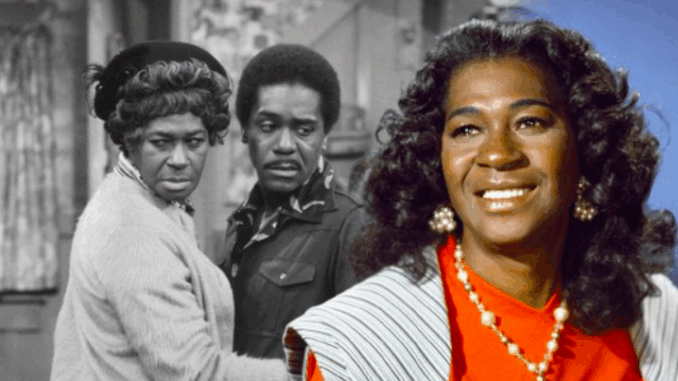
She marched through the Sanford junkyard like she owned it — Bible in hand, purse swinging, ready to unleash a holy storm on anyone who crossed her. To fans of Sanford and Son, Aunt Esther was an unstoppable force. To Fred Sanford, she was a “gorilla-faced, Bible-thumping, sass-mouthed heifer.” But to millions of viewers, she was one of the most memorable, misunderstood, and magnetic characters on television.
Played with divine fire by comedian LaWanda Page, Aunt Esther was more than just a loudmouth relative. She was the embodiment of a particular kind of matriarch — proud, principled, and completely unwilling to be dismissed. In a series driven by Fred’s sarcasm and Lamont’s quiet frustrations, Esther stood tall, defiant, and hilarious. And beneath her insults and over-the-top faith was a character far deeper than people often realized.
The Woman Behind the Wig
LaWanda Page was a powerhouse in her own right — a former striptease dancer turned stand-up comic, known for raunchy routines that could make sailors blush. So when Redd Foxx, her longtime friend, recommended her for the role of Aunt Esther, NBC executives were skeptical. Could a woman that wild play someone that religious?
She proved them wrong almost instantly. Page brought a Pentecostal rhythm to her performance — blending fire-and-brimstone delivery with biting wit. She transformed Aunt Esther into a walking contradiction: a woman of God who threw punches, shouted insults, and never hesitated to scrap with Fred in the middle of the living room.
Her catchphrases — “Watch it, sucka!” and “You fish-eyed fool!” — became cultural staples. Her glare alone could freeze a room. And yet, under all the performance, LaWanda infused Esther with a truth: she wasn’t acting pious. She believed in what she was saying. Even when the audience laughed, Esther wasn’t joking.
The Gospel of Tough Love

What made Aunt Esther unique wasn’t just that she was funny. It was that she was unapologetically powerful. In an era when Black women were often confined to roles as maids, background wives, or soft-spoken neighbors, Esther kicked down the door.
She was religious, yes — but not demure. She wasn’t a supporting character. She commanded every scene.
Aunt Esther represented a familiar figure in many Black households: the stern churchgoing aunt who demanded respect, enforced morality, and clashed with anyone who questioned her authority. She wasn’t always easy to love — but she was impossible to ignore.
Her arguments with Fred Sanford were more than just comedic bickering. They were symbolic battles between two worldviews: cynicism vs. faith, chaos vs. order, sin vs. salvation. And while Fred often got the last joke, Esther never lost her dignity. She walked out with her Bible held high and her wig untouched.
A Battle of Wits and Wounds
Some of the most iconic scenes in Sanford and Son came from Fred and Esther’s verbal wars. She called him a heathen; he called her ugly. She threatened him with divine retribution; he threatened her with a two-by-four. But behind their feud was something strangely tender.
Fred and Esther clearly cared about each other — even if they would never admit it. In moments of crisis, Esther showed up. When Fred needed prayer (or a punch), she was there. And when Esther faced hardship, Fred — despite all his bluster — never truly abandoned her.
Their relationship mirrored a deeper truth: that family doesn’t have to be sweet to be strong. They fought like enemies but protected like siblings. In their own dysfunctional way, they were each other’s safety net.
Esther and the Audience
Part of what made Esther such a fan favorite was her authenticity. Viewers knew women like her. She reminded them of real relatives — not TV versions of Black womanhood, but the actual matriarchs who held households together with one hand while swinging a slipper with the other.
And for Black audiences in particular, Aunt Esther was a revelation. She wasn’t trying to make white audiences comfortable. She didn’t code-switch. She didn’t shrink herself. She was bold, Black, and Biblical — and she wasn’t going anywhere.
In doing so, she opened the door for future characters like Florence on The Jeffersons, Madea in Tyler Perry’s films, and even modern Black sitcom moms. Without Esther, many of those characters might not exist in the form we know today.
LaWanda Page’s Real-Life Legacy
Offscreen, LaWanda Page was just as unapologetic. She once said, “I always knew there was room on television for a woman like me — they just didn’t know it yet.” And she was right.
Her rise from nightclub comedy to national fame was extraordinary. She stayed close to Redd Foxx throughout their careers and appeared on shows like Amen, Martin, and Family Matters. But she always returned to Esther — the character that made her a legend.
In the 1980s and ’90s, Page toured churches and comedy clubs alike, fusing religion with razor-sharp humor. She was proof that a woman could be holy and hilarious, spiritual and street-smart — and she never saw those traits as opposites.
Conclusion: Not Just a Punchline
Aunt Esther was never just a joke. She was a reminder that strength doesn’t always come with softness, that love doesn’t always look like affection, and that comedy can be wrapped in scripture and sass at the same time.
In the golden era of television, she was one of the few characters who could walk into a scene, shout “Heathen!” and bring the house down — while still making millions of viewers reflect on faith, family, and the fiery power of Black womanhood.
Decades after her debut, Aunt Esther still lives on — in memes, reruns, and the memories of every viewer who recognized a little bit of their own auntie in her righteous rage and wild-eyed wisdom.